- Home
- John Cheever
Bullet Park Page 7
Bullet Park Read online
Page 7
“I’ve talked this over with Mr. Northrup, Tony, and we’ve reached a decision. Since you seem unable to manage your own time with any efficiency we are going to give you a little assistance. We are going to ask you to give up football.”
He had not anticipated this staggering injustice. He would not cry but there was a definite disturbance in his eyeducts. She didn’t know what she was saying. She knew, poor woman, much less about football than he knew about French. He loved football, loved the maneuvers, the grass work, the fatigue, and loved the ball itself—its shape, color, odor and the way it spiraled into the angle of his elbow and ribcage. He loved the time of year, the bus trips to other schools, he loved sitting on the bench. Football came more naturally to him than anything else at his time of life and how could they take this naturalness away from him and fill up the breach with French verbs?
“You don’t know what you’re saying, Miss Hoe.”
“I’m afraid I do, Tony. I’ve not only talked with Mr. Northrup. I’ve talked with Coach.”
“With Coach?”
“Yes, with Coach. Coach thinks it will be better for you, better for our school, better perhaps for our football team if you spent more time at your studies.”
“Coach said this?”
“Coach said that you were enthusiastic but he doesn’t think that in any way you’re indispensable. He thinks perhaps that you’re wasting your time.”
He stood. “You know what, Miss Hoe?” he asked.
“What, Tony,” she said. “What, dear?”
“You know I could kill you,” he said. “I could kill you. I could strangle you.”
She stood, hurling her chair against the walls of Carcassonne, and began to scream. Her screaming brought Mr. Graham, the Latin teacher, and Mr. Clark (science) running. She stood at her desk, her arm outflung, pointing at Tony. “He tried to kill me,” she screamed. “He threatened to kill me.”
“There, there, Mildred,” said Mr. Graham. “There, there.”
“I want a policeman,” she screamed. “Call the police.” Mr. Clark called the office through the squawk box and asked for the secretary to call the police. Mr. Clark picked up Miss Hoe’s chair and she sat in it, trembling and breathing heavily but sternly as if she were about to upbraid an unruly class. Tony simply stared at his hands. Then in the distance they heard the sound of a police siren that seemed, excited and grieving, not to come from the autumn twilight but from some television drama in which they were the actors or combatants, playing out nothing so simple as poor French marks and a mistaken threat. Tony was Miss Hoe’s long-lost brother who had just returned from his travels with the news that their beautiful mother was a well-known communist spy. The science teacher would have been Miss Hoe’s husband—a dreary failure whose business misadventures and drinking bouts had brought her to the brink of a nervous breakdown—and Mr. Clark came from the FBI. Thus, juxtaposed for a moment by the sound of the siren, they seemed about to have their dilemma interrupted by an advertisement for painkillers or detergents, until the police came in, asking, “What’s up, what’s going on here?” Vandalism had been their guess, although it was the wrong time of day—but vandalism was the usual complaint. Why did kids want to rip the lids off desks and break windows. Miss Hoe raised her head. Her poor face, shining with tears, was ugly. “He tried to kill me,” she said. “He tried to kill me.”
“Now Mildred,” said Mr. Clark. “Now Mildred.”
“Don’t I have any protection at all,” she cried angrily. “Are you all going to stand around and defend this murderer until I’m found some night with a broken neck? How do you know he doesn’t have a knife. Has anyone searched him? Has anyone even asked him a question?”
“You got a knife, Sonny,” one of the police asked.
“No,” said Tony.
“You try to kill this lady?”
“No, sir,” said Tony.
“You try to kill this lady?”
“No, sir. I got angry at her and said that I’d like to but I didn’t touch her. I wouldn’t ever touch her.”
“I want something done about this,” Miss Hoe said. “I am entitled to some protection.”
“You want to file charges against him lady? Felonious assault, I guess.”
“I do,” Miss Hoe said.
“All right. I’ll take him down to the station and book him. Come on, Sonny.”
The corridor was crowded by this time with teachers, secretaries and janitors, none of whom knew what had happened and all of whom were asking one another what it was. Tony and the police had gotten to the end of the corridor and were about to turn out of sight when Miss Hoe cried: “Officer, Officer.” It was a frightened voice and they turned quickly.
“Could you take me home, will you drive me home?”
“Where do you live?”
“Warwick Gardens.”
“Sure.”
“I’ll just be a minute.”
She got her coat, turned off the lights and locked the door to her classroom. She came swiftly down the hall, through the crowd, to where they waited. She got into the back seat of the car and Tony sat in front between the two police. “It’s very kind of you to take me home,” Miss Hoe said. “I do appreciate it, but I’m terribly afraid of the dark. When I go into the cafetorium for my lunch the first thing I think of is that it will get dark in four hours. Oh, I wish it would never get dark—never. I suppose you know all about that lady who was mistreated and strangled on Maple Street last month. She was my age and we had the same first name. We had the same horoscope and they never found the murderer …”
One of the police walked her to the door of the Warwick Gardens and then they drove to the police station in the center of town. Tony explained that his mother was in the city but that his father usually came out on the 6:32. “Well, the judge won’t be here until eight or later,” one of the police said, “and we can’t book you without the judge but you don’t look very desperate to me and I’ll remand you in the custody of your father as soon as he comes home. The lady seemed a little hysterical …”
It was, of course, the first time Tony had been in the police station. It was a new building, not in any way shabby, but definitely grim. Fluorescent tubing shed a soulful, grainy and searching light and an extraordinarily harsh and unnatural voice was coming from a radio. “Five foot eight,” said the voice. “Blue eyes. Crooked teeth. A scar on the right side of the jaw. A birthmark at the back of the neck. Weight one hundred and sixty pounds. Wanted for murder …” They took down Tony’s name and address and invited him to sit down. The only other civilian in the place was a shabbily dressed man who wore a stained, white silk scarf around his neck. His clothing was greasy and threadbare, his hands were black but the white silk scarf seemed like a declaration of self-esteem. “How long do I have to stay here,” he asked the lieutenant at the desk.
“Until the judge comes in.”
“What did I do wrong?”
“Vagrancy.”
“I hitched a ride on Twenty-seven,” the vagrant said. “I asked this guy to stop the car so I could take a piss and as soon as I got out of the car he drove away. Why would he do a thing like that?” The lieutenant coughed. “Well you don’t have long for this world,” the vagrant said. “You don’t have long for this world with a cough like that. Ha. Ha. A doctor told me that twenty-eight years ago and you know where the doctor is now? Six feet under. Pushing up daisies. He died a year later. The secret of keeping young is to read children’s books. You read the books they write for little children and you’ll keep young. You read novels, philosophy, stuff like that and it makes you feel old. You fish in the river?”
“Some,” said the lieutenant, putting as much disinterest into the sound as he could. The vagrant offended his nose, his sight and his sense of the fitness of things, not because of his manifest eccentricity but because he had heard the story so many times. They were all alike, the roadside vagrants, they suffered a sameness greater than the intellectual and sump
tuary sameness of the businessmen who rode the 6:32. They all had theories, travels, diets, colorful pasts, studied conversational openings, and they usually wore some piece of soiled finery like the white silk scarf.
“Well, I hope you don’t eat the fish,” the vagrant said. “That river’s nothing but an open toilet. All the shit from New York City comes up the river twice a day on the tides. You wouldn’t eat the fish you found in a toilet, would you? Would you?”
Then he turned to Tony and asked: “What you here for, Sonny.”
“Don’t tell him,” said the lieutenant. “He’s not here to ask questions.”
“Well, can’t I be friendly,” the vagrant asked. “Perhaps if we had a little conversation we might discover that we have some interests in common. For instance I’ve made a study of the customs and history of the Cherokee Indians and a great many people find this interesting. I once lived with them on a reservation in Oklahoma for three months. I wore their clothes, observed their customs and ate their food. They eat dogs, you know. Dogs are their favorite food. They boil them mostly although sometimes they roast them. They …”
“Shut up,” said the lieutenant.
At quarter to seven they called Nailles, who answered and said that he would be right over. When he strode into the station and found his son there his first impulse was to embrace the young man but he restrained himself. “You can take him home,” the lieutenant said. “I don’t think anything much will come of this. He’ll tell you what happened. The complainant seems to have been a little hysterical.”
Tony told his father what had happened as they drove home. Nailles had no counsel, advice, censure, experience or any other paternal qualities to bring to that crazy hour. He understood the boy’s deep feelings about being dropped from the squad and he seemed to have shared in his son’s felonious threatening of Miss Hoe. A little wind was blowing and as they drove, leaves of all colors—but mostly yellow—blew through the shaft of their headlights and what he said was: “I love to see leaves blowing through the headlights. I don’t know why. I mean they’re just dead leaves, no good for anything, but I love to see them blowing through the light.”
VII
It was an autumn afternoon. Saturday.
Below the house, near the grove of dead elms, there was a swamp where a flock of red-winged blackbirds nested each spring. According to the law of their species they should have turned south in the autumn but the number of bird-feeding appliances in the neighborhood, overflowing with provender, had rattled their migratory instincts and they now spent the autumn and winter in Bullet Park in utter confusion. Their song—two ascending notes and a harsh trill like a cicada—was inalienably associated with the first long nights of summer but now one heard it in the autumn, one heard it in the snow. To hear this summery music on one of the last clement days of the year was like some operatic reprise where the heroine, condemned to death, hears in her dark cell (Orrido Carcere) the lilting love music that was first sung at the beginning of Act II. The wind that day was westerly and after lunch one heard the thump-thump-thump of a base drum from the football field where the band was warming up for a home game.
Tony, after having been dropped from the squad, did not, of course, spend his spare time studying irregular verbs. Instead he read poetry as if he shared, with the poets, the mysterious and painful experience of being forced into the role of a bystander. He had not read poetry before. Nailles was not so obtuse as to protest but he was uneasy. He might say that poetry was one of the most exalted of the arts but he could not cure himself of the conviction that poetry was the demesne of homely women and morbidly sensitive men.
As soon as Tony heard the bass drum that afternoon he went upstairs and lay down on his bed. Nailles was worried and called up the stairs: “Tony, hey Tony, let’s do something, shall we? Let’s go for a ride or something.”
“No thank you, Daddy,” Tony said. “What I think I’ll do is to go into New York if you don’t mind. I’ll go to a movie or maybe see the basketball game.”
“That’s fine,” Nailles said. “I’ll drive you to the train.”
At three the next morning Nailles woke. He got out of bed and started down the hall towards Tony’s room. He felt very old, as if while he slept he had put down the dreams of a strong man—snow-covered mountains and beautiful women—in exchange for the anxieties of some decrepit octogenarian who feared that he had lost his false teeth. He felt frail, wizened, a shade of himself. Tony’s bed was empty. “Oh, my God,” he said loudly. “Oh, my God.” His only and dearly beloved son had been set upon by thieves, perverts, prostitutes, murderers and dope addicts. He was, in fact, not so much afraid of the pain his son might know as of the fact that should his son endure any uncommon pain he, Nailles, would have no resources to protect him from the terror of seeing his beloved world—his kingdom—destroyed. Without his son he could not live. He was afraid of his own death.
He went back down the hall, closed the door to the room where Nellie slept and went downstairs, where he telephoned the New York City bureau of missing persons. There was no answer. He then called the central police office but they had no record of anyone like Tony. He gave them his number and asked them to call if there was any news. He drank half a glass of whiskey and then walked around the living room saying, “Oh, God, oh, God, oh, God.” Then he went upstairs, took a Nembutal, got into bed and lost consciousness a few minutes later.
Nailles woke at half past seven and went back to Tony’s room, which was empty. He then woke Nellie and told her the boy was missing. He telephoned the missing persons bureau but there was still no answer and when he telephoned the police they had no news. The next train from New York was the 8:10 and having absolutely nothing else to go on he settled for a kind of specious, single-minded hopefulness. Tony would be on that train. He felt that if he hoped strenuously enough for the boy’s return the boy would appear. He drove to the station and when the train came in Tony appeared, surrounded by that mysterious company of men and women who travel on Sunday mornings and who invariably carry paper bags. Nailles embraced his son, embraced him until his bones cracked, and asked: “Oh my God, why didn’t you telephone, why didn’t you tell us.”
“It was too late, Daddy. I didn’t want to wake you up.”
“What happened?”
“Well, I was feeling blue about football and I thought I’d buy a book of poetry so I went into a bookstore and there was this nice lady—Mrs. Hubbard—and we talked and then I asked her if she’d have dinner with me and she said why didn’t I come to her apartment—she called it her flat—and she’d cook me dinner and so I did.”
“Did you spend the night with her?”
“Yes.”
Nailles knew that his son was a mature male and he had no reason to protest that the boy had acted as one; but what sort of a woman would pick up a young man in a bookstore and hustle him home to bed?
“Was she a slut?”
“Oh, no, Daddy, she’s very nice. She’s a widow. She graduated from Smith. Her husband was killed in the war.”
This irritated Nailles. She had given her husband to her country and thus he must give his son to her. He somehow thought it the responsibility of war widows to remarry hastily and not to parade their forlornness throughout society, stressing the inequities of warfare. If she was attractive, intelligent and clean why hadn’t she remarried?
“Well, we can’t tell your mother. It would kill her. We’ll have to make up some story. You went to a basketball game and it went overtime and you spent the night at the Crutchmans’.”
“But I’ve asked her to lunch.”
“Who.”
“Mrs. Hubbard.”
“Oh, my God,” said Nailles. “Why did you do that?”
“Well, she’s lonely and doesn’t seem to have many friends and you’ve always told me that I should ask people to the house.”
“All right,” Nailles said. “This is our story. You went into a bookstore and you met a lonely war widow
and you asked her to lunch. Then you got some dinner somewhere and you went to a basketball game and you spent the night at the Crutchmans’. Right?”
“I’ll try.”
“You’d damned well better.”
Nellie embraced her son tenderly. He said that he had invited a widow for lunch and Nailles explained that Tony had spent the night at the Crutchmans’. The boy might possibly dissemble but he was incapable, Nailles knew, of a forthright lie.
“How are the Crutchmans,” Nellie asked. “I haven’t seen them for so long. Do they have a nice guest room? They’ve always urged us to use it but I always like to come home. I suppose we ought to send them something. Do you think we ought to send them flowers? I could write them a note.”
“Oh, don’t bother,” Nailles said. “I’ll send them something.”
After breakfast Nailles asked Tony if he wanted to cut wood but the boy said he thought he’d do his homework. The word “homework” touched Nailles—it seemed to mean innocence, youth, purity, simple things—all lost in the bed of a sluttish war widow. He felt sad. He cut wood until it was time to bathe and dress and then he made a drink. Nellie was cooking a leg of lamb and this humble and innocent smell filled the kitchen. He looked at Nellie for some trace of suspiciousness, reflection or misgiving but she seemed so unwary, so truly innocent that he went to the stove and kissed her. Then he went to the living room window and waited.
Tony parked the car in the driveway and opened the door for Mrs. Hubbard, who got out laughing. She wore a gray Chesterfield with a velvet collar and carried an umbrella, which she swung in a broad arc, striking the ground like a walking stick. Her right arm was hooked rakishly in Tony’s and she seemed propelled forward partly by Tony, partly by the umbrella. She was shorter than he and looked up into the young man’s face with a flirtatiousness that angered Nailles. She wore no hat and her hair was a nondescript reddish color, obviously dyed. Nailles, at a glance, put her age at thirty. Her heels were very high and this made the calves of her legs bulge a little. Her face was round and flushed and Nailles wondered. Indigestion? Alcohol? He opened the door and welcomed her politely and she said:

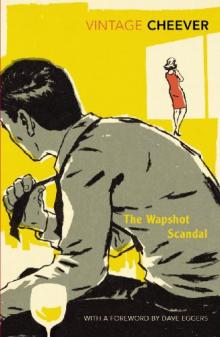 The Wapshot Scandal
The Wapshot Scandal The Stories of John Cheever
The Stories of John Cheever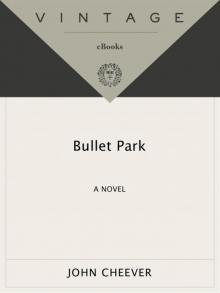 Bullet Park
Bullet Park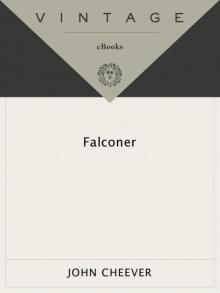 Falconer
Falconer The Journals of John Cheever
The Journals of John Cheever Oh What a Paradise It Seems
Oh What a Paradise It Seems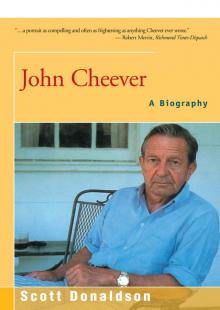 Scott Donaldson
Scott Donaldson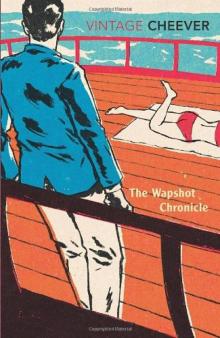 The Wapshot Chronicle
The Wapshot Chronicle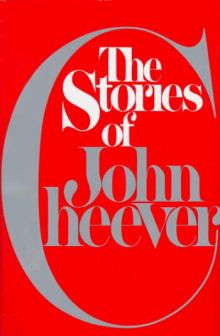 The Stories of John Cheever (1979 Pulitzer Prize)
The Stories of John Cheever (1979 Pulitzer Prize)